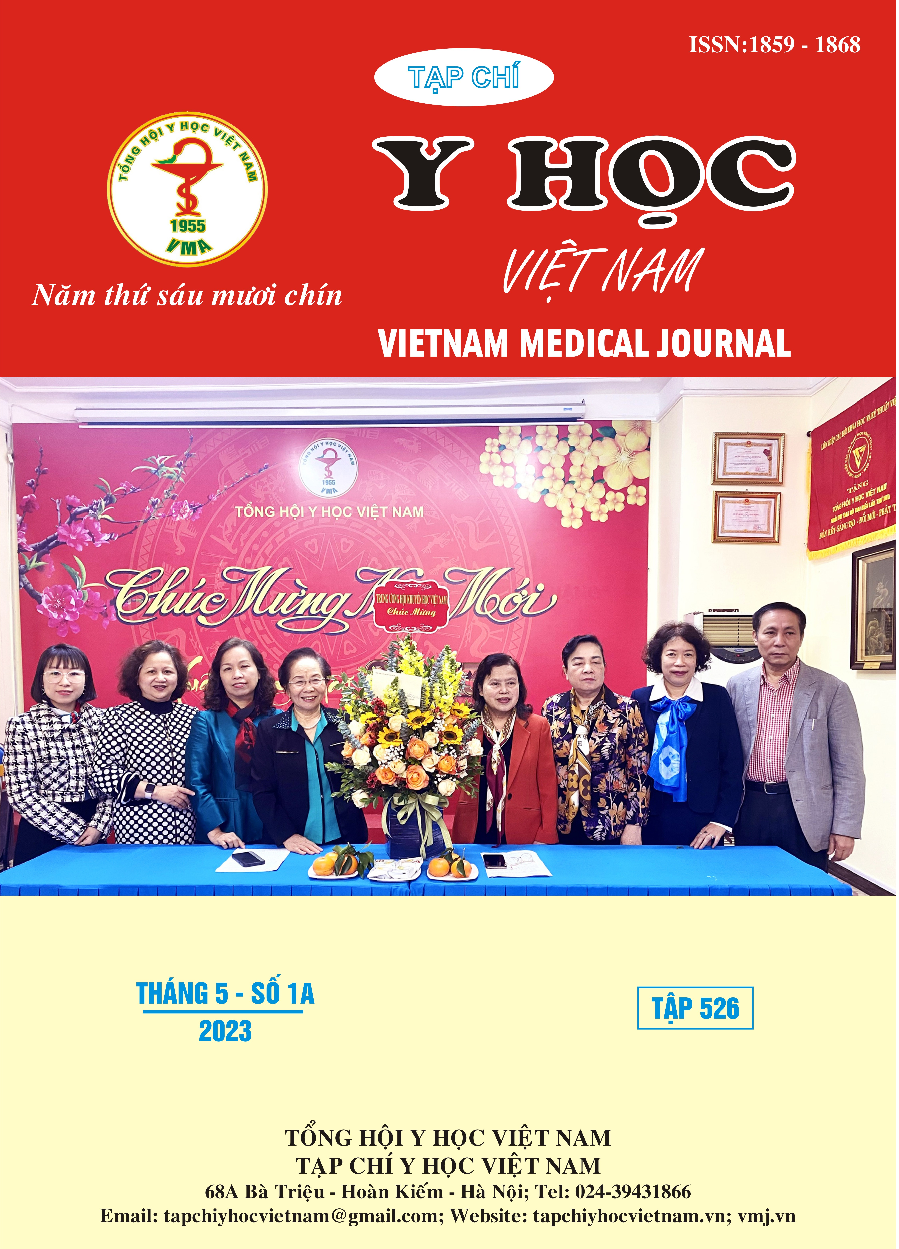ANTI-SARS-COV-2 ANTIBODY LEVELS OF HEALTHCARE WORKERS AFTER MORE THAN 12 WEEKS OF VACCINATION
Main Article Content
Abstract
Objective: Investigating the anti-SARS-CoV-2 antibody levels in healthcare workers at Nguyen Tri Phuong Hospital, HCMC after more than 12 weeks of 2 doses-vaccination. Subjects and methods: a case-series study, from 10/2021 to 06/2022, random samling among healthcare workers at Nguyen Tri Phuong Hospital who had received 2 full doses of SARS-CoV-2 vaccines, the 2nd dose was taken at least 12 weeks prior to the antibody examination date. Personal information, history of COVID-19 infection, medical history and vaccination record were collected. Blood samples were taken for anti-Sars-CoV-2 levels in plasma (Sars-CoV-2 IgG II Quant, Abbott) at 2 time points: (1) out of 12 weeks after the 2nd dose; and (2) 12 weeks after the first sample collection date. The median antibody concentrations and the association with individual characteristics were calculated and examined accordingly. Results: 85 participants joined the first test and 83 of them were continued to the second test. There was no difference in the demographic and epidemiological characteristics of the study subjects between the 2 time points. In the interval between two blood tests, 92,9% of study participants received a third dose of vaccine. The antibody concentrations (medians and interquartiles) at the 1st & the 2nd blood examinations are 649,9 (203,8-4089) mAU/mL and 18049,7 (3651,5-21701,2) mAU/mL, respectively. In all subgroups, the median antibody concentration increased at the 2nd test compared to the 1st time, due to the 3rd injection. At each examination: the infected group had antibody levels higher than the uninfected group; administration of mRNA vaccines increases antibody titer responses more than vector vaccines, regardless of whether 2 or 3 doses were given; the group that ensured the time interval between 1st and 2nd injections had higher antibody concentrations than the others. When analyzing the level of paired antibodies before and after the 3rd injection, it was shown that the 3rd injection really had the effect of increasing the antibody levels, especially in the group that had never been infected and had no underlying disease. Conclusions: Antibody concentrations were very variable, indicating the impact of individual characteristics on antibody response. The factors affecting antibody response were recorded, including the interval between doses, underlying health issues and types of vaccine.
Article Details
Keywords
anti-Sars-CoV-2 antibodies, COVID-19 vaccine.
References
2. El-Ghitany, E.M., et al., Determinants of the Development of SARS-CoV-2 Anti-Spike Immune-Response after Vaccination among Healthcare Workers in Egypt. 2022. 10(2): p. 174.
3. Barocci, S., et al., Evaluation of Two-Month Antibody Levels after Heterologous ChAdOx1-S/BNT162b2 Vaccination Compared to Homologous ChAdOx1-S or BNT162b2 Vaccination. 2022. 10(4): p. 491.
4. Eyre, D.W., et al., Quantitative SARS-CoV-2 anti-spike responses to Pfizer-BioNTech and Oxford-AstraZeneca vaccines by previous infection status. Clin Microbiol Infect, 2021. 27(10): p. 1516.e7-1516.e14.
5. Assaid, N., et al., Anti-SARS-CoV-2 Antibody Responses 5 Months Post Complete Vaccination of Moroccan Healthcare Workers. 2022. 10(3): p. 465.
6. Monin-Aldama, L., et al., Interim results of the safety and immune-efficacy of 1 versus 2 doses of COVID-19 vaccine BNT162b2 for cancer patients in the context of the UK vaccine priority guidelines. 2021.
7. Chenchula, S., et al., Current evidence on efficacy of COVID‐19 booster dose vaccination against the Omicron variant: A systematic review. 2022. 94(7): p. 2969-2976.
8. Wald, A.J.J., Booster vaccination to reduce SARS-COV-2 transmission and infection. 2022. 327(4): p. 327-328.
9. Saltoglu, N., et al., Heterologous Booster COVID-19 Vaccination Elicited Potent Immune Responses in HCWs.
10. Kunal, S., et al., Mix and match COVID-19 vaccines: potential benefit and perspective from India. 2022. 98(e2): p. e99-e101.


